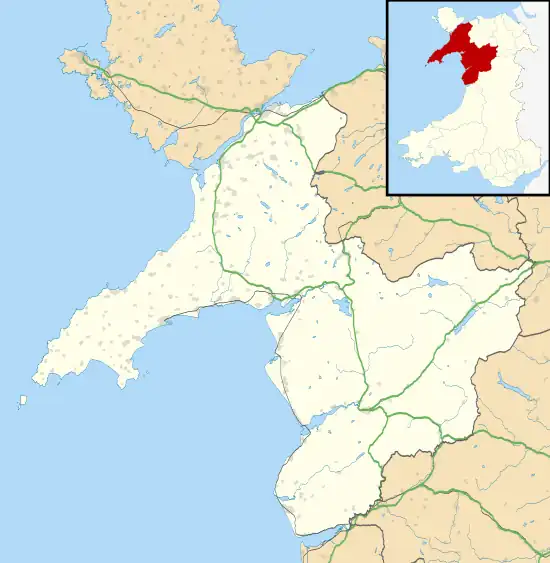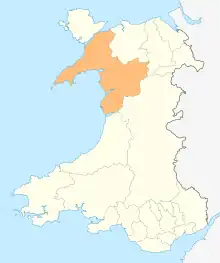| Nantmor | |
|---|---|
 The chapel at Nantmor | |
 Nantmor Location within Gwynedd | |
| OS grid reference | SH604460 |
| Community | |
| Principal area | |
| Country | Wales |
| Sovereign state | United Kingdom |
| Post town | CAERNARFON |
| Postcode district | LL55 |
| Dialling code | 01766 |
| Police | North Wales |
| Fire | North Wales |
| Ambulance | Welsh |
| UK Parliament | |
| Senedd Cymru – Welsh Parliament | |
Nantmor is a hamlet which lies about 1½ miles to the south of the village of Beddgelert in Gwynedd, Wales.
The current spelling of the name Nantmor is more modern – most old documents[1] from the 16th to the 18th century record the name as Nanmor.
It lies close to the scenic Aberglaslyn Pass and the Welsh Highland Railway. Nantmor station has re-opened, following a 2007 vote in its favour by local residents.
A car park run by the National Trust is a popular starting point for walks up to Cwm Bychan or along the Afon Glaslyn.
The village is perhaps most famous for being the home of Dafydd Nanmor, a renowned 15th century bard (died c. 1490), who took his name from the hamlet, as did Rhys Nanmor after him. Dafydd Nanmor himself was possibly a bardic student of Rhys Goch, who lived at neighbouring Hafod Garegog.
Filmed in Nantmor in 1957, the Inn of the Sixth Happiness is a 1958 British 20th Century Fox film based on the true story of Gladys Aylward, a tenacious British maid, who became a missionary in China during the tumultuous years leading up to the Second World War.
Carneddi, a nearby hill farm, was the home of Ruth Janette Ruck, who published a trilogy of books about her experiences in the 1950s, 1960s and 1970s, namely Place of Stones, Hill Farm Story and Along Came a Llama. In 1980 she featured in the HTV About Britain series in an episode called "The Lady and the Llama", which featured a year on the farm.[2]
References
- ↑ "Melville Richards Archive Place-Name Database - Agreement". www.e-gymraeg.co.uk.
- ↑ "BFI | Film & TV Database | The LADY AND THE LLAMA (1980)". 19 April 2012. Archived from the original on 19 April 2012.
